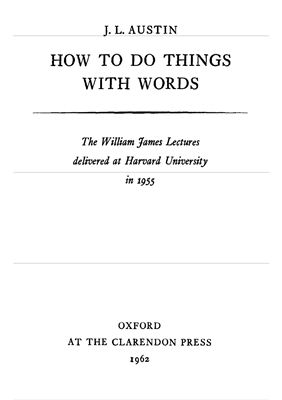Oxford, 1962.
How to Do Things With Words is perhaps Austin's most influential work. In it he attacks what was at his time a predominant account in philosophy, namely, the view that the chief business of sentences is to state facts, and thus to be true or false based on the truth or falsity of those facts. In contrast to this common view, he argues, truth-evaluable sentences form only a small part of the range of utterances. After introducing several kinds of sentences which he assumes are indeed not truth-evaluable, he tus in particular to one of these kinds of sentences, which he deems performative utterances. These he characterises by two features:
* First, to utter one of these sentences is not just to "say" something, but rather to perform a certain kind of action.
* Second, these sentences are not true or false; rather, when something goes wrong in connection with the utterance then the utterance is, as he puts it, "infelicitous", or "unhappy".
How to Do Things With Words is perhaps Austin's most influential work. In it he attacks what was at his time a predominant account in philosophy, namely, the view that the chief business of sentences is to state facts, and thus to be true or false based on the truth or falsity of those facts. In contrast to this common view, he argues, truth-evaluable sentences form only a small part of the range of utterances. After introducing several kinds of sentences which he assumes are indeed not truth-evaluable, he tus in particular to one of these kinds of sentences, which he deems performative utterances. These he characterises by two features:
* First, to utter one of these sentences is not just to "say" something, but rather to perform a certain kind of action.
* Second, these sentences are not true or false; rather, when something goes wrong in connection with the utterance then the utterance is, as he puts it, "infelicitous", or "unhappy".

